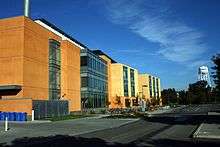American Institute of Wine & Food
The American Institute of Wine & Food is a non-profit organization dedicated to gastronomy and food culture. The Institute was founded in 1981 by a group of food industry professionals and enthusiasts, including Julia Child and Robert Mondavi.[1] Today, the organization includes educational programs, a bimonthly publication titled Savor This, and local chapters across the United States.

Mission
On their website, the group aims to further “the understanding, appreciation and quality of wine and food through fun educational experiences.”[2] The AIWF implements these goals by awarding scholarships to culinary programs, organizing lessons about food and health for schoolchildren, and hosting community events.
History
The initial concept for the AIWF was led in 1979 by John Ronsheim, as a university gastronomy program.[3] Ronsheim recruited 57 culinary experts to advise in the program’s development including Julia Child, James Beard, Robert Mondavi, Jeremiah Tower, Alice Waters, and Barbara Kafka.[3] In the following years, Ronsheim coordinated efforts to find a host university and investors for the program.[3]
In 1981, the Institute was officially formed after funding a special collection of books on the culinary arts in an agreement with the University of California at Santa Barbara.[3] Richard Graff was the first president.[4]
The organization began to hold conferences and dinners which address topics such as sustainable eating and the benefits of local ingredients.[4] The first of these was The Conference of Gastronomy held in New York City in 1985.[5] The AIWF also began publishing an academic journal, The Journal of Gastronomy, to highlight emerging and relevant research.[5] The journal was published from 1984 to 1991.[6]
The Institute eventually began local chapters across the United States, and today there are 13 regional chapters.[7] The AIWF also currently sponsors special collections at the University of California at San Diego and at the Radcliffe Institute for Advanced Study at Harvard University.
Notes
- Barrier 1989.
- AIWFMission, Our Mission.
- Kowit 2001, pp. 29-35.
- Goldstein 2013, pp. 283-285.
- Chasanow-Richman 1985.
- Smith 2012, p. 401.
- AIWFChapters, Local Chapters.
References
- Barrier, Michael (December 1989), "Food for Thought", Nation’s Business, retrieved 15 October 2015
- "Our Mission", American Institute of Wine and Food, retrieved 15 October 2015
- "Local Chapters", American Institute of Wine and Food, retrieved 15 October 2015
- Goldstein, Joyce (2013), Inside the California Food Revolution, California Studies in Food and Culture, 44, University of California Press, ISBN 9780520956704
- Kowit, Adam (2001), "Imagining the American Institute of Wine and Food: The Legacy of John Ronsheim", Gastronomica, University of California Press, 1 (4): 29–35, doi:10.1525/gfc.2001.1.4.29
- Chasanow-Richman, Phyllis (1985-02-10), "A Scholarly Inquiry Into Culinary Pleasures", The Washington Post, retrieved 2015-10-19
- "American Institute of Wine & Food Culinary Collection", Harvard University Library, retrieved 15 October 2015
- "American Institute of Wine & Food Recipe Books", The Library at UC San Diego, archived from the original on 18 September 2015, retrieved 15 October 2015
- Smith, Andrew (2012), The Oxford Encyclopedia of Food and Drink in America, Oxford University Press, ISBN 9780199734962